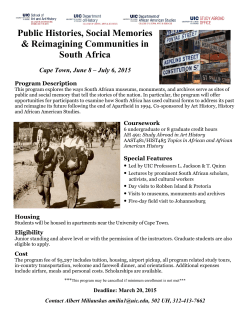
The good, the bad, and the mediocre - PINS
Psychology in society (PINS), 1996, 21, 95-98
The good, the bad, and the mediocre
Book review
Moller, AT (ed)(1995) Perspectives on personality. Durban: Butterworths.
ISBN 0 409 10928 2.
Bruce Gillmer
Department of Psychology
University of Natal
Durban
There is a geme of Westerns that has always pleased me enormously. Like this text
has. There were mostly good ous, some of whom turned nasty, a few bad from the
outset, and always one ugly.
It is, I believe, the first text on personality theory by South African psychologists in
the English language. The contributors are all Afrikaner academics. The intended
reader is likely to be an undergraduate at an English campus who is increasingly
likely to be "non-European", or that New South African student, the black English
second-language student at an Afrikaans university. All well and good so far.
Perspectives on personality does not grasp the obvious nettle of a South African or
African perspective on personality. The intended reader is likely to be historically
and culturally ill-prepared to grapple with the esoterics of personality theory or,
put more correctly, has very different ideas about personality or whether such a
notion exists in the way that eurocentric thinkers imagine it does. Take the
utilitarian and endlessly exploited notion of ubuntu. Is it an ethos, an African
"world-view", an inculcated attitude as in Inkatha-inspired civic preparedness
education, a dispositional characteristic that "runs through the veins of all
Africans" (Mdluli, 1987:64)? South African constitutional lawyers have seen fit to
make explicit use of it in the epilogue of that document, which in its entirety has
been described by certain members of the constitutional court as being permeated
by ubuntu (S v Makwanyane & Mchunu, 1995). Ubuntu is never defined in the
Constitution of South Africa. However in the case cited above , which effectively
abolished the death penalty, Judge Madlala refers to the concept thus:
"The need for ubuntu expresses the ethos of an instinctive capacity for and
enjoyment of love towards our fellow men and women; the joy and fulfilment
involved in recognizing their innate humanity; the capacity this generates in
interaction within the collective community, the richness of the creative emotions
95
which it engenders and the moral energies whicli it releases both in the givers and the
society which they serve and are served by'' (p68) (emphases added).
Judge Mokgoro is more specific: "Generally, ubuntu translates as humaneness. In
its most fundamental sense, it translates as personhood and morality.
Metaphorically, it expresses itself in umuntu ngumuntu ngabantu" (p18), which
roughly means that "a person is not a person without a community of other
persons". Lest one loses sight of the significance for personality theory, "ubuntu
means 'being human'" (Mdluli, 1987:64).
&a.mining notions like this in a South African text book on personality goes, one
would trust, beyond paternalistic indigenizing of native curiosities. To not take
cognisance of what would seem to lie at the heart of what it means to be a person
for the vast majority of the population one is considering, not to mention writing
for, is an oversight of not insignificant slightness. The only ugly and one for which
Moller cannot bear the entire blame.
The contributors reflect the paradigms presumably influential in their
departments. Behavioural-genetics, a vital development in recent years (Plomin &
Rende, 1991; Rowe, 1992), is eschewed yet the more obscure theorists like Adler,
Ellis, Sullivan, and Frankl are accorded entire chapters. Allport is the sole
representative of mainstream trait theory. Bowlby and attachment theory do not
feature. Ultimate explanations are secular rather than evolutionary. The book falls
somewhere between an introduction to the big three - psychoanalysis,
behaviourism, humanism - on the one hand and the psychotherapies derived from
the various theories on the other. All bads, or at least pities.
Yet Perspectives succeeds as a no-frills, highly accessible, and affordable
contribution. In parts as good as or better than the hard cover American glossies
bloated with more clever "boxes", 3-D illustrations, and peculiarly angled photos
than sense. Moller and his contributors will and should be criticised but they have
produced something that many undergraduates will take to readily. What is needed
is a second edition with a wider group of contributors from the other South African
campuses in order to achieve a more representative and even-handed product.
The chapter on Adler by Francois Swartz is a concise and remarkably clear critical
account of a theory that has not received much attention outside of its devotees.
The emphasis on personal responsibility has strong links with existentialism and
purposefulness with the intentionality of philosophers like Dennett (1987). I, for
one, had no idea that the widely acclaimed Systematic Training for Effective
Parenting (STEP) has Adlerian underpinnings. Andre Moller does a solid,
comprehensive job with learning theory. Unfortunately the account stops in the
mid 1970s and needs to be supplemented with the development of social-cognitive
theory (Mischell, 1993). Bennie de Vos' unravelling of obscurant Husserl,
Kierkegaard and Boss is a particularly fine section and should come as a great
relief to those struggling with linguistically arcane theory. Harry Stack Sullivan's
often overlooked notions are nicely integrated with those he influenced like
Bateson, Leary, Kiesler and Jay Haley's strategies of psychotherapy. Suzanne
Shuda's account is highly readable yet economical. The highlight of the book is
Zac Nel's occupation-orientated perspectives on personality. In dealing with
96
Holland and Super one has for the first time an unself-conscious and practical
exposition of applied psychology in South Africa, as well as interesting anecdotes
of these theorists' personal links with the country. An articulate and informed
section with references that are more contemporary than in some of the earlier
chapters. There is a small gem in Louw and Moller's intriguing rendition of Kelly's
construct theory illustrating its singular contribution to the psycholinguistics of
personality. All good, some very.
Less effective is the mechanistic account of Freud and psychoanalysis. Moller does
warn against too literal an acceptance of the topographic and structural models of
consciousness and personality but the power of metaphor is elusive as is almost
always the case in introductory textbooks. Freudian theory is more than that
"shrivelled thing described and studied by behavioural scientists" (Bloom, 1991:4).
The intellectual and political history of psychoanalysis in South Africa is
overlooked. It would have been apposite to bring the South African link of Wolpe,
Lazarus, and Rachman into the chapter on behaviourism. All Wits boys. That's
bad. The relevance of Albert Ellis to an introductory text is questionable. His
contribution is really to cognitive behaviour therapy and to mauling the English
language ("demandingness", "awfulising"). Carl Rogers' non-committal democracy
dawdles aimlessly through a poor section by de Vos, after a surprisingly upbeat
Maslow that slumps into secular moralising.
The work is uneven both as a whole and within sections. There is a lurking
suspicion that some overreached their particular areas of expertise and also that
too much was attempted instead of the writers remaining within what should have
been a few central focused tenets.
As it stands Moller's Perspectives is definitely to be recommended as an ancillary
to texts like Phares (1991), Mischell (1993) and Engler (1995) to mention a few I
could readily prescribe. At RlSO (negotiable with publisher for bulk purchase) it is
affordable though not cheap, it renders the theories that it deals with readily
accessible, and it is to be applauded as a first step to a South African perspective
on personality; which could be very good.
REFERENCES.
Bloom, L (1991) Back to Freud: A radicalism recalled. Psychology in Society, 15,
4-23.
Dennett, D (1987) The intentional stance. Cambridge, Mass.: MIT Press.
Engler, E {1995) Personality theories. 4th ed. Boston: Houghton Mifflin.
Mdluli, P (Blade Nzimande) {1987) Ubuntu-botho: lnkatha's ''peoples education".
Transformation, 5, 60-77.
Mischell, W (1993) Introduction to personality. 5th ed. Fort Worth: Harcourt
Brace.
97
Phares, E J (1991) Introduction to penonality. 3rd ed. New York: Harper Collins.
Plomin, R & Rende, R (1991} Human behavioural genetics. Annual Review of
Psychology, 42, 161-190.
Rowe, DC (1992) A paradigm shift? Contemporary Psycholol}', 37, 285-286.
State v Makwanyane and Mchunu (1995) Judgement. 6 June 1995. Constitutional
Court of the Republic o~ South Africa. Case No CCT 3/94.
98
© Copyright 2025









